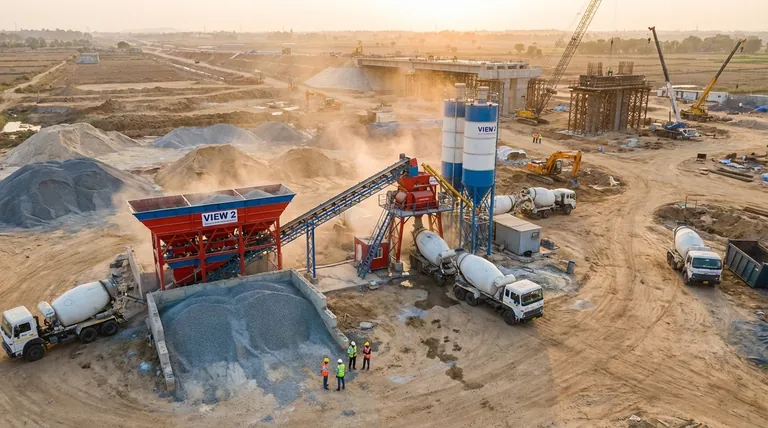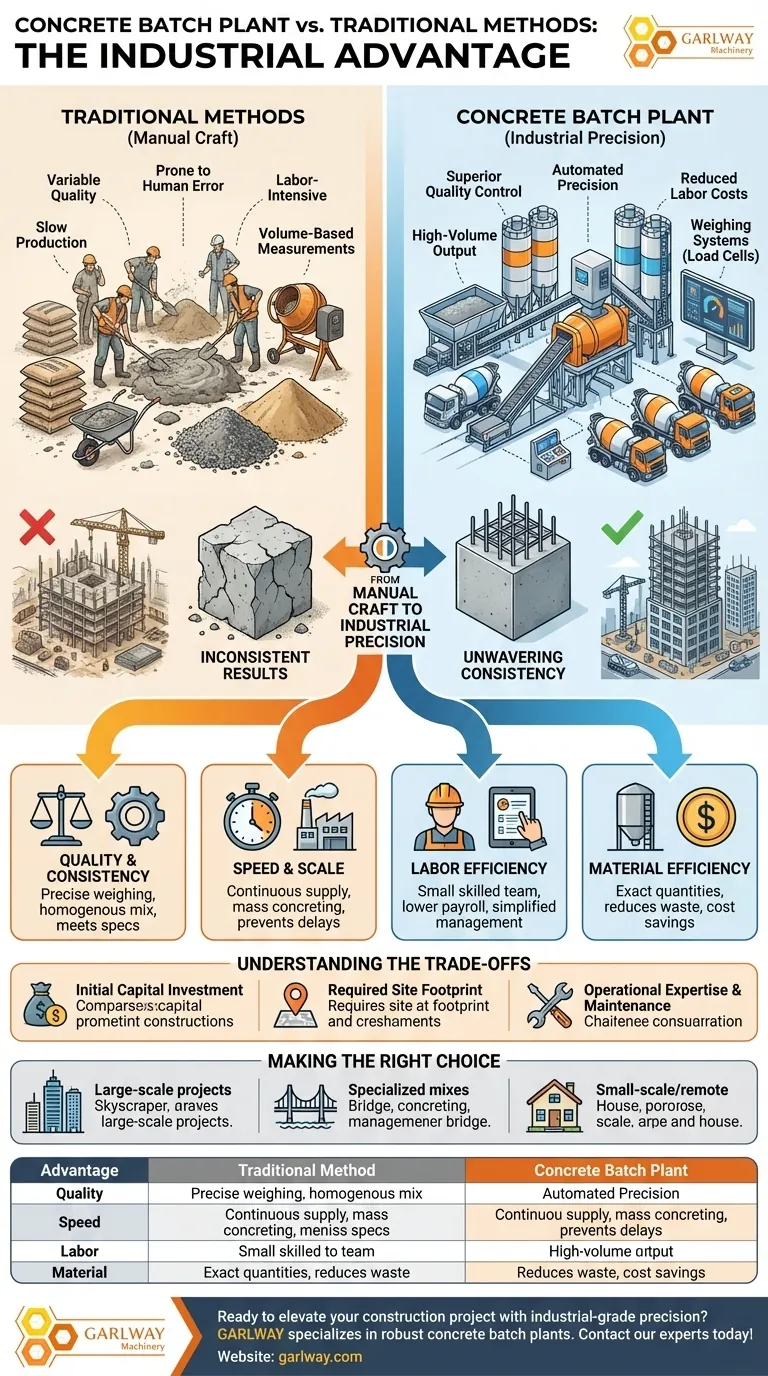In short, a concrete batch plant transforms concrete production from a variable, labor-intensive task into a highly efficient, precise, and scalable industrial process. The primary advantages are superior quality control, significantly faster production speed, reduced labor costs, and the ability to consistently meet the demands of large-scale construction projects.
The fundamental shift is from manual approximation to automated precision. A batch plant replaces the variability of hand-mixing with the reliability of a controlled, repeatable system, ensuring every batch meets exact specifications.

The Core Advantage: From Manual Craft to Industrial Precision
Traditional concrete mixing often relies on volume-based measurements and manual labor, which introduces significant potential for error. A concrete batch plant systematizes the entire process, leading to fundamental improvements in the final product and the production workflow.
Unwavering Quality and Consistency
A plant uses sophisticated weighing systems (load cells) to measure every component—cement, sand, aggregate, water, and chemical admixtures—by exact weight.
This automated precision eliminates the human error common in traditional methods, where ingredient ratios can vary significantly from one mix to the next.
The result is a homogenous, high-quality concrete mix that consistently meets strict engineering and structural specifications for strength and durability.
The Mechanics of Speed and Scale
Batch plants are designed for high-volume output. Powerful mixers and automated conveyor systems can produce a continuous supply of concrete far exceeding what a manual team could ever achieve.
This capability is essential for large projects like high-rise buildings, bridges, or foundations that require large, uninterrupted concrete pours (mass concreting).
The ability to produce concrete on-demand and at scale prevents costly delays and ensures project timelines are met.
Rethinking Labor and Material Efficiency
Automating the mixing process has a profound impact on project costs and on-site logistics. It shifts resources from manual labor to more critical construction tasks.
Reducing On-Site Labor Costs
A concrete batch plant is operated by a small team of skilled technicians, drastically reducing the number of laborers needed for mixing and transporting concrete.
This not only lowers direct payroll expenses but also minimizes the associated costs and complexities of managing a large workforce.
Optimizing Material Usage
The precise measurement systems inherent to a batch plant prevent the waste of expensive materials, particularly cement.
By ensuring exact quantities are used for every batch, the plant eliminates the over-use that often occurs with manual mixing, leading to direct material cost savings over the course of a project.
Understanding the Trade-offs
While the advantages are significant, a concrete batch plant is not the right solution for every situation. Understanding its limitations is key to making an informed decision.
Initial Capital Investment
The primary barrier is the high upfront cost of purchasing, transporting, and setting up a batch plant. This is a significant capital expenditure compared to buying a few portable mixers.
Required Site Footprint
A batch plant requires a considerable amount of space for the machinery itself, as well as for storing large stockpiles of cement, sand, and aggregates. This can be a challenge on constrained urban construction sites.
Operational Expertise and Maintenance
Operating a batch plant requires trained technicians, not general laborers. The machinery also involves regular, specialized maintenance to ensure its accuracy and reliability, adding to the operational overhead.
Making the Right Choice for Your Project
The decision to use a concrete batch plant hinges on the specific requirements of your project, balancing the need for quality and volume against logistical and financial constraints.
- If your primary focus is a large-scale commercial or infrastructure project: A batch plant is essential for meeting the demands of speed, volume, and stringent quality control.
- If your primary focus is achieving specialized, high-performance concrete mixes: The precision of a batch plant is the only reliable way to guarantee complex mix designs are executed perfectly every time.
- If your primary focus is a small-scale or remote residential project: Traditional mixing methods are often more practical and cost-effective due to the lower setup costs and simpler logistics.
Ultimately, choosing a concrete batch plant is an investment in consistency, speed, and quality at scale.
Summary Table:
| Advantage | Traditional Method | Concrete Batch Plant |
|---|---|---|
| Quality & Consistency | Variable, prone to human error | Precise, automated, consistent mix quality |
| Production Speed & Scale | Slow, limited volume | High-volume output for large projects |
| Labor Efficiency | Labor-intensive, large crew | Operated by a small team of technicians |
| Material Efficiency | Higher risk of material waste | Precise measurement reduces waste |
Ready to elevate your construction project with industrial-grade precision?
GARLWAY specializes in providing robust concrete batch plants, along with winches and concrete mixers, for construction companies and contractors globally. Investing in a GARLWAY plant is an investment in the consistent quality, speed, and cost-efficiency your large-scale projects demand.
Contact our experts today to discuss how a GARLWAY concrete batch plant can be the powerhouse for your next project!
Visual Guide

Related Products
- HZS35 Small Cement Concrete Mixing Batch Plant
- HZS180 Ready Mix Concrete Plant for Foundations with Sand and Cement
- HZS75 Concrete Batching Plant Cement Mixer Price Concrete Mixer Bunnings Mixing Plant
- HZS120 Ready Mix Concrete Batching Plant Commercial Mud Cement Mixer
- JW1000 Mobile Cement Mixer Concrete Mixer Truck and Batching Plant
People Also Ask
- What are the factors to be considered when designing a concrete mixture? Master the Balance for Strength & Workability
- What are the factors influencing choice of a concrete mixing plant? Key Considerations for Efficiency
- How does a small cement mixer save time? Automate Mixing & Boost Efficiency on Your Site
- How are the roads within a concrete mixing station typically designed? Optimize for Safety and Efficiency
- What are the components of concrete mixing? Master the Ingredients and Machinery for Perfect Results


















